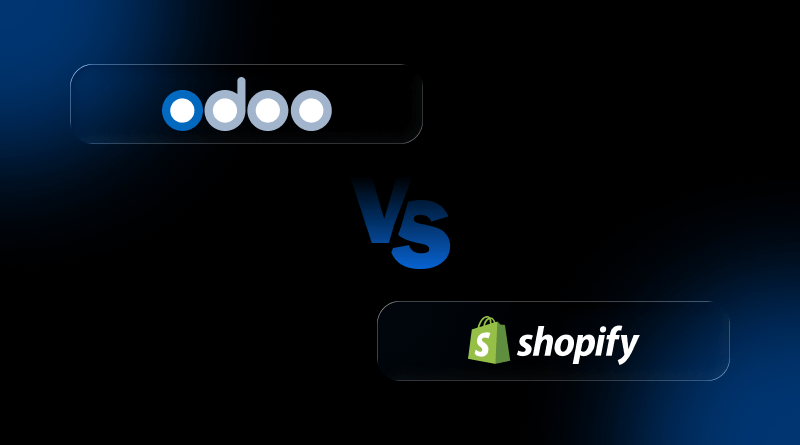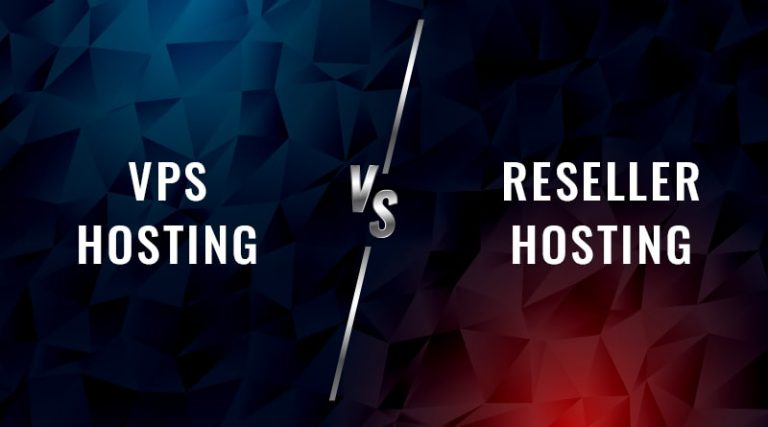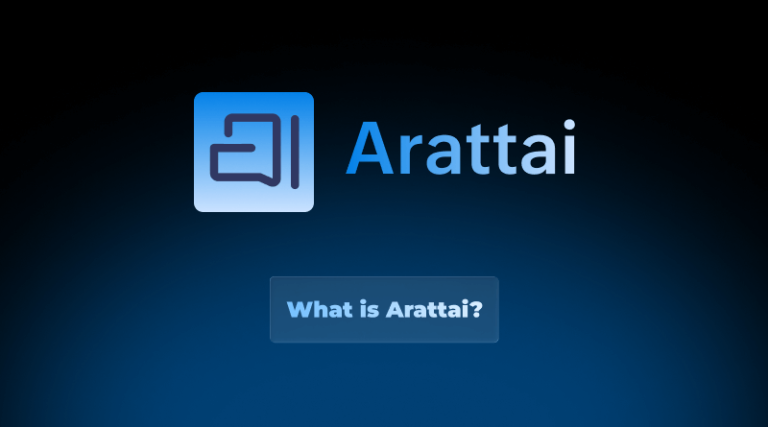Are you a business with your online store open?
Well, mark the words—”Businesses that open online shops need to do more than just sell products.”
While sales and revenue are the ultimate goals, businesses need to integrate their sales, inventory, marketing, accounting, customer service, and all other logistics. Every service claims to have the best solution. But the real value is offering better service at lower costs and with minimal effort.
Some business owners are delighted to have a simple interface, robust web hosting, perfect marketing integration and finally a visually appealing online store. On the one hand, there are others who prefer integration with a complex operational tool that can manage sales and marketing alongside a real-time, proficient CRM and administrative tool. These different needs are the place where the debate of Shopify vs. Odoo comes ahead.
Shopify is user-friendly and simple to set up. It is a plug-and-play solution for customers who don’t need a complex operational tool. For customers who do, Odoo is the more versatile option. It provides seamless integration with over 82 other business applications and a comprehensive solution than just a dedicated sales tool. It provides a dedicated server solution for implementing and running a holistic sales chain.
If you are looking for a comprehensive comparison including long-range costs, growth potential, how well the system integrates with other ones, operational difficulty, and other important components, then that blog is your answer. This comparison will make it easier for growing D2C brands, businesses with ERP requirements, and those businesses that are stuck between store speed and operational control. It will help you to select the system that best fits your business model and overarching vision.
Table Of Content
What is Shopify?

Shopify is an easy-to-use, dedicated e-commerce platform for businesses to set up, run, and grow an online store. They offer a fully e-commerce hosting solution, where users are free of server administration, security, server updates, and any performance improvements. This is often referred to as Shopify hosting, since everything is done on Shopify’s cloud services, and store owners do not have to do any server or technical management.
Because of its easy-to-use interface, AI-like-drag-and-drop website builder, built-in seamless payment processing, and a huge marketplace for integrations, Shopify is a platform of choice for many growing businesses, from small companies to global enterprises, that are looking for a quick and easy way to gain internet access and begin sales without hosting or complicated setups.
Similar Useful Reads:
What is Odoo?
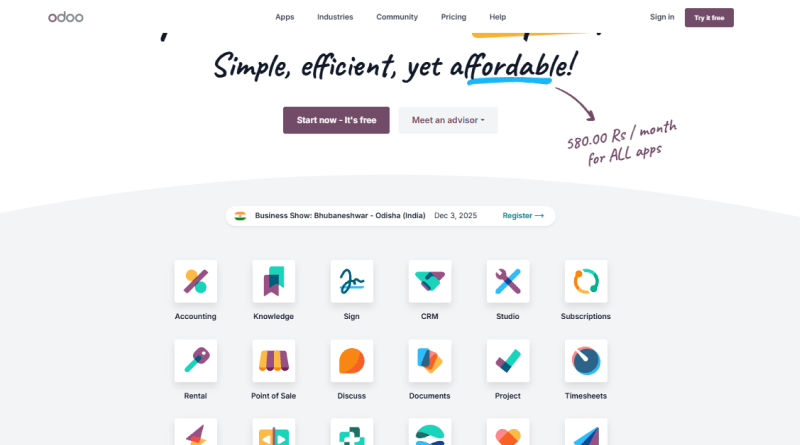
To begin with, Odoo is open-source, which means you are free to manipulate the code as you wish. This makes it easy to tailor Odoo to the apps and extensions you wish to use. Odoo is also all-in-one, as it has modules for inventory, CRM, accounting, eCommerce, manufacturing, POS, marketing automation, project management, and more. With eCommerce integration, Odoo is more than a store builder; it is a complete ERP hosting platform.
Odoo is different from Shopify, which is a hosted solution. Odoo is self-hosted, which means it needs to be installed on a server for functionality. Therefore, most companies opt for Odoo VPS hosting for better performance, security, and customization. With the Odoo VPS, you can run the eCommerce and ERP modules on a dedicated virtual private server environment while controlling updates, modules, workflows, and scaling to your requirements.
Odoo is growing, and its ability to integrate a standalone online shop with back-office operations like invoice generation, stock movement, and logistics is a huge plus for companies. While Odoo is more complex than Shopify, it is a more open system and thus better for ERP-based companies.
Detailed Head-to-Head Comparison: Shopify vs Odoo
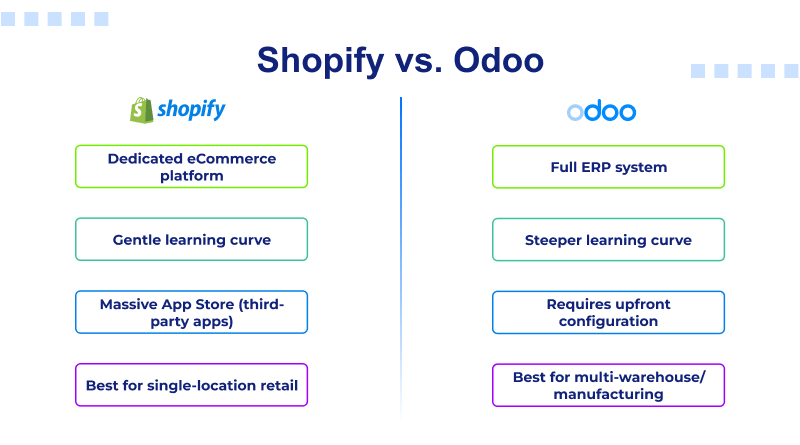
1. Shopify vs Odoo: Resource Optimization and Flexibility
A. Shopify, the eCommerce Specialist
- Core Focus: Shopify is designed to perform one thing, and that is to help businesses sell online, period. Everything from product uploads to checkout optimization is centered on commerce.
- Ease of Use: When it comes to ease of use, Shopify, pulled by an industry-leading margin, wins here as well. In comparison to Odoo’s ease of use, Shopify has an easy learning curve, and hence excels.
- User Experience (UX): Exceptional, guided onboarding processes and dashboards streamline the entire process, managing the user experience in an optimal way for users launching a store for the first time, for which there is no experience. Predictable and visual systems are organized and structured to assist users with daily operational tasks of product management, order tracking, and payment facilitation.
- Who It’s Best For: Solo founders, small teams, and startup entities with limited technical skill beyond the login level find Shopify an obvious first choice. For users looking to accelerate the pace of installation and ongoing operations, it is without doubt the best experience.
B. Odoo: The Integrated System
- Core Focus: Odoo does not only build stores; rather, it is a complete ERP system, of which e-commerce is a part. Odoo integrates the entire operational system with a full suite of business applications, from inventory and CRM to accounting and purchasing.
- Ease Of Use: Odoo users need more time to learn to configure multiple interlinked backend systems. A user must appreciate workflows across several apps in order for the e-commerce component to perform acceptably.
- Complexity (UX): Unlike other solutions in the market, Odoo does not do guided, commerce-standalone setups. To even have your store run adequately, you need to align things like product SKUs, stock routes, customer info, taxes, and accounting beforehand. This means more work at the inception of the store; however, it does also mean Odoo’s complex systems will be more deeply integrated across your operations.
- Who It’s Best For: Odoo fits companies best where there exists an online store needing a close digital integration with internal operations. The more heavily e-commerce relies on an integrated systems strategy, the more of the gap is with competitors like Shopify.
2. Shopify vs Odoo: ERP Advantage
A. Shopify Integration Through Applications
- App-Focused Market Model: Shopify has over 1200 applications that can be integrated with Odoo. Connecting all the applications to structure end-to-end process flows can take considerable effort. Users of Shopify can be prompted to use additional applications for accounting, inventory, ERP, CRM, and logistics.
- The Trade-Off: The reliance on other apps eats away at your monthly subscription and creates even more potential vulnerabilities. Sometimes, data lags behind when communicating between systems, leading to fragmentation and visibility constraints. While Shopify does pure e-commerce simplicity, it cannot even come close to the operational depth Odoo has for ERP driven businesses.
B. Odoo’s Seamless Internal Integration
- The ERP Core: Odoo’s ecosystem is built with e-commerce as one of the final modules to be integrated. Every time an order is placed, the e-commerce integration routes it seamlessly to other modules like CRM hosting, accounting, inventory, HR, or manufacturing. Odoo is one of the few platforms that do not require connectors and, as such, have zero API dependency for inter-module communication.
- Highly Configurable: Odoo is modular and can be customized to the businesses’ preferences. Odoo can be changed with front-end modifications using HTML and CSS and logic automation with Python. Such flexibility makes Odoo suitable to solve business needs that other systems cannot solve.
3. Shopify vs Odoo: Business and Inventory Management
- Shopify Inventory: Simple and Store-Centric
To put it simply, Shopify is excellent for simple retail setups but becomes limited as operational complexity increases. It has a user-friendly inventory system that is perfect for a basic online store. It is efficient for businesses dealing with a single location with basic fulfillment and simple stock level management. For advanced operations like any form of manufacturing, multi-stage fulfillment, or automated restock, users need to purchase separate apps.
- Odoo Inventory: The Operational Powerhouse
Odoo has one of the most sophisticated inventory management systems of any e-commerce platform. It accommodates multiple warehouses, barcode management, batch and wave picking, automated restock rules, and real-time trackers for stock movement. Since there is tight integration with sales, purchases, and manufacturing, all inventory changes are updated throughout the system in real-time. This is more control than one could ask for, and it greatly benefits businesses that contend with massive SKUs, several locations, or complicated order flows.
4. Shopify vs Odoo: Pricing and Accounting
A. Pricing Comparison
- Shopify: The pricing on Shopify is quite simple and starts at ~£29.88 a month. There is a transaction, so higher plan pricing should be for Shopify Payments for a lower rate, and there are a couple of apps on a monthly basis to use for each extension. Upgrading to Shopify Plus for a ~£919.44 monthly fee, you can host sites with much larger volumes. A long-term contract is often obligatory.
- Odoo: Odoo works on a modular, pay-per-user system and is priced at roughly ~£29.88 per month for each user. The Community Edition of Odoo is free, but most companies utilize the Enterprise Edition that has more advanced features, more implementation of Odoo will be inevitable; however, it will be less expensive for the implementation of Odoo on more advanced features.
B. Accounting Integration
- Shopify: There is no accounting system with Shopify, which therefore creates a two-system setup, which is external and costly. This works for smaller companies.
- Odoo: Odoo has a built-in accounting system. Vendors, invoices, and journal entries are completed and are all synced. Odoo’s accounting system is ideal for a business with complicated operations.
Recap Table: Shopify vs. Odoo at a Glance
The choice between Shopify and Odoo depends on understanding exactly what your business needs-speed or system depth, simplicity, or total integration. Both Shopify and Odoo excel, but in different ways.
| Feature | Choose Shopify If… | Choose Odoo If… |
| Goal | You want a quick launch and a platform focused purely on online sales | You want deep integration across sales, inventory, accounting, CRM, HR, and operations |
| Technical Skill | You prefer minimal setup, no coding, and straightforward store management | You have higher technical skill or are willing to invest in implementation partners |
| Inventory | Single-location or simple D2C inventory needs | Multi-warehouse, manufacturing workflows, or complex supply chains |
| Cost | You want the lowest upfront cost with predictable monthly tiers | You want long-term savings through system consolidation and automation |
| Scalability | You want an e-commerce-first platform that grows with your sales | You want an ERP backbone that supports every part of your business |
| Customization | You prefer apps and themes over backend customization | You need deep backend customization and workflow automation |
Pick Shopify if:
Pick Odoo if:
FAQs
1. Which platform is better for a startup lacking technical skills?
Given that startups with little to no technical skills possess considerable operational creativity, Odoo is more suitable for them. Odoo is more relevant for beginners with creativity to operate and customize processes.
2. Which platform offers a more intuitive interface for daily management?
Shopify is easier and more intuitive for everyday management because its dashboard is simple and clean and is designed for users with minimal technical understanding, so they can make product updates, track orders, and do marketing effortlessly.
3. Which platform offers more advanced multi-warehouse operations?
When it comes to more advanced multi-warehouse or complex inventory operations, Odoo is much more powerful. It is able to support more advanced workflows, real-time stock movements, automated replenishment, barcode routing, and ERP level warehouse logic. In contrast, Shopify can only do basic multi-location stock management and relies on third-party apps for more complex operations.
4. Which platform is better for businesses with complex or unique workflows?
When it comes to businesses with unique and complex workflows, Odoo is the better solution. Its ERP architecture gets customized down to the module level and caters to manufacturing, services, and accounting, and seamlessly grounds every workflow integration. While Shopify is easier to use, it lacks this depth without several external apps.

